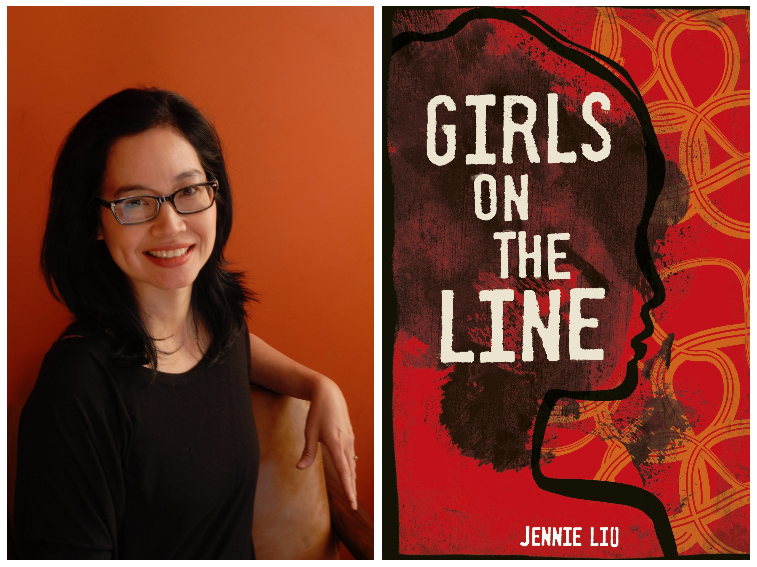Asheville-based author Jennie Liu’s latest project, Girls on the Line, is a young adult novel about two teenage girls coming of age in contemporary China. She’ll launch the book at Malaprop’s on Wednesday, Nov. 7.
While Liu is the daughter of Chinese immigrants, she says she really didn’t find a passion for her own heritage until she went to college. During an interview in the children and teens section of Pack Memorial Library (“I have two kids,” she says. “I truck down here a couple of times a week.”), Liu explains. Her parents allowed her and her siblings to pursue their own interests, and while she did read a lot as a teen, “I probably spent more time trying to assimilate into the white culture.” In college, however, her attitude changed, inspired in part by reading authors such as Amy Tan, but also by what her sister, an Asian studies major, had discovered about their family’s history.
“Growing up, we lived in very tight quarters, but we didn’t know each other very well,” she says. So it was a revelation for Liu to read her sister’s thesis about their father’s experience fleeing the Japanese occupation of northern China in the Sino-Japanese War.
As the Japanese advanced, Nationalist Chinese leaders put out a call to save the children caught in the conflict. This campaign manifested as a poorly planned march across China.
“My father was the only son, and his parents pushed him to go on this journey, which turned out to be horrible,” Liu says. “It ended up being mostly on foot, so he just went hundreds and hundreds of miles with 300-500 children they collected along the way — with not enough resources, not enough food, no place to stay along the journey and, really, no place to land.”
After the defeat of the Japanese, the civil war between the Nationalists and the Communists forced Liu’s father out of the country. While he ended up surviving and, to an extent, thriving — he worked as a doctor in Taiwan, northern Africa and finally in the U.S. — his escape meant that he spent most of his adult life separated from his family. It meant, too, that he never saw his parents again.
Liu, who had aspirations to be a writer from an early age, soon decided she wanted to turn her father’s story into a novel. This proved to be a daunting task: She spent years researching Chinese history and spent time interviewing her father about his experience. Despite these challenges and the demands of parenting and her career, Liu completed the novel and landed an agent for it. But, as sometimes happens, the novel didn’t find a publisher.
Undaunted, Liu pursued her next project, a story about contemporary China. Intrigued by what she knew of Chinese orphanages, Liu says she “just started wanting to write a story about the people who don’t get adopted.”
This idea developed into the plot of Girls on the Line, in which two young women, Luli and Yun, raised together in an underresourced provincial orphanage, have just begun their adult lives by taking jobs at a local factory. But then Yun becomes pregnant by her disreputable boyfriend, and the two girls struggle to meet this challenge on their own terms. They navigate the trauma and stigma of their orphan childhoods, China’s restrictive family planning policies, the lawlessness that plagues rural China (including trafficking in wives and children) and the ever-present demands of propriety and family.
The novel deals squarely with the reality of being young in China without status, money or the support network that a family provides. Still, it’s fast-paced and suspenseful, and it has what Liu describes as a hopeful ending. And yet she also admits, “It’s kind of a dark book.” She says that as she wrote it, “One thing I definitely was thinking about over and over is that when you’re disadvantaged, you’re in such the muck of it you don’t even have the luxury of hoping for a better life.”
If readers take anything away from the book, Liu wants it to be an understanding that she hopes will evoke empathy in the U.S. — a nation she believes has come to prioritize self-interest above all else.
“People are just looking out for themselves and not thinking about people who are disadvantaged,” she says. “But it’s just not that easy when things are generationally stacked against you — institutionally, generationally, societally stacked against you.”
WHAT: Jennie Liu launches her novel Girls on the Line, in conversation with Joanne O’Sullivan
WHERE: Malaprop’s, 55 Haywood St., malaprops.com
WHEN: Wednesday, Nov. 7, 6 p.m.



Before you comment
The comments section is here to provide a platform for civil dialogue on the issues we face together as a local community. Xpress is committed to offering this platform for all voices, but when the tone of the discussion gets nasty or strays off topic, we believe many people choose not to participate. Xpress editors are determined to moderate comments to ensure a constructive interchange is maintained. All comments judged not to be in keeping with the spirit of civil discourse will be removed and repeat violators will be banned. See here for our terms of service. Thank you for being part of this effort to promote respectful discussion.